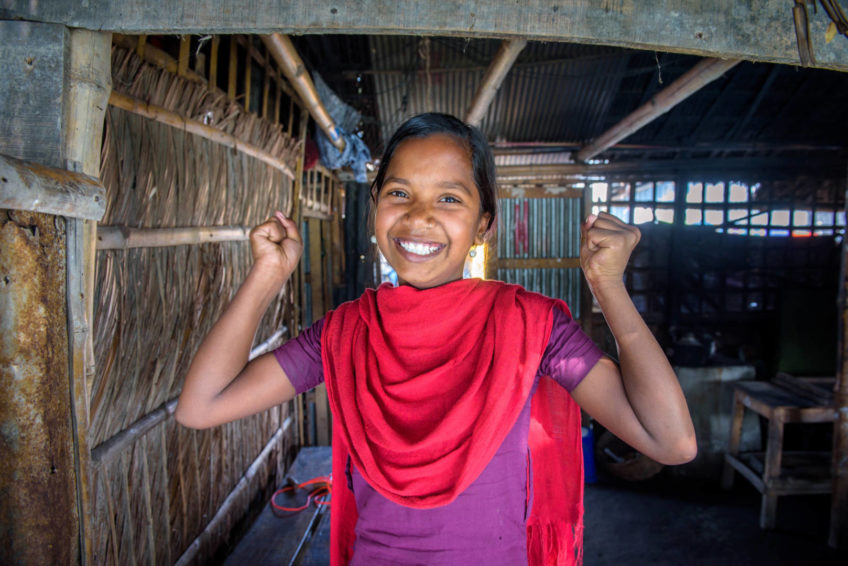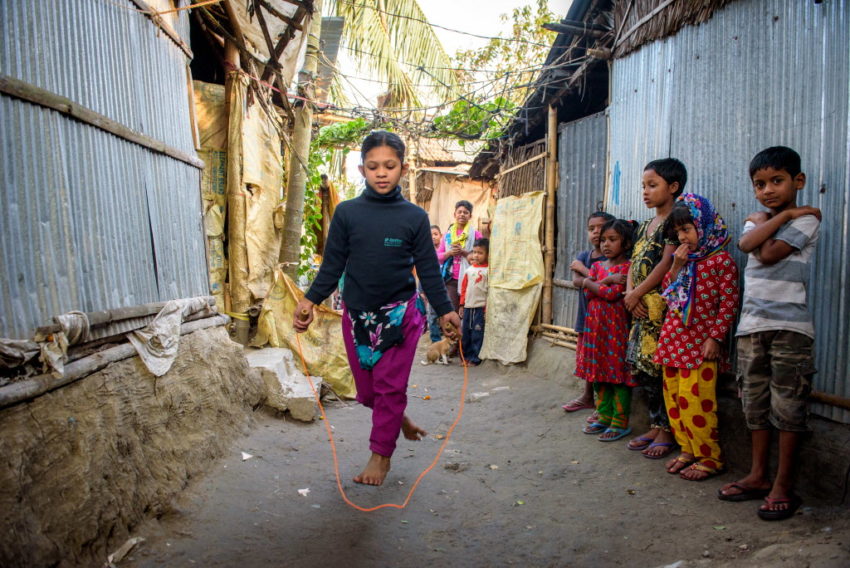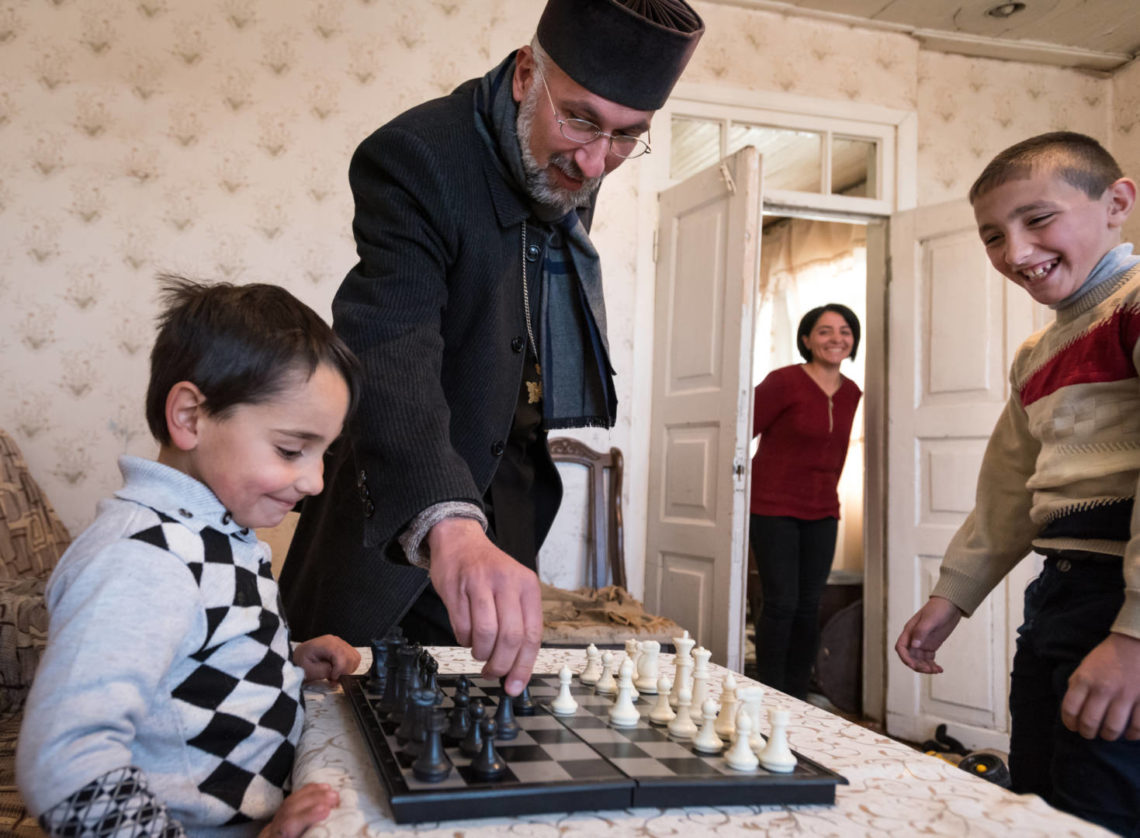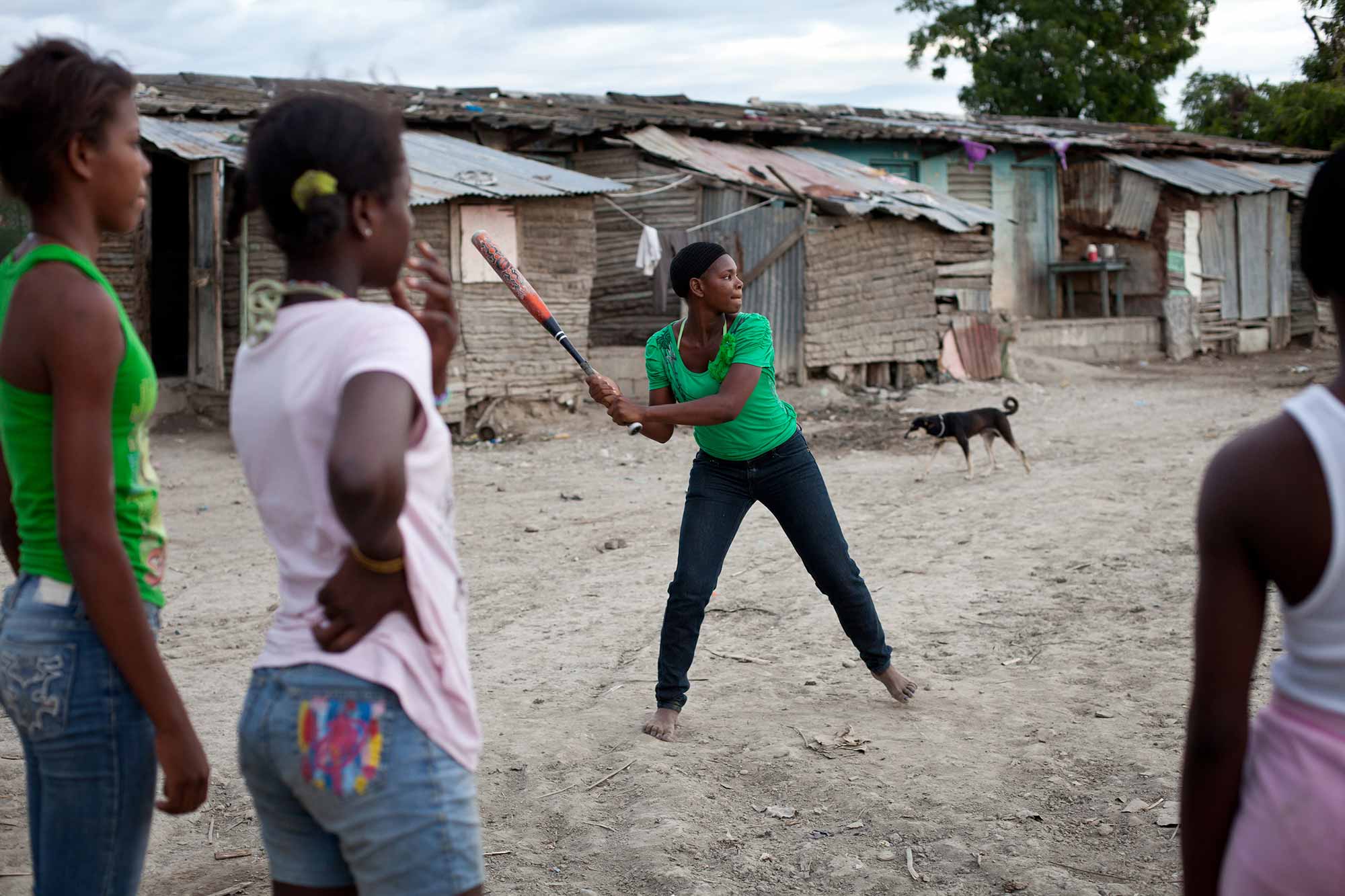

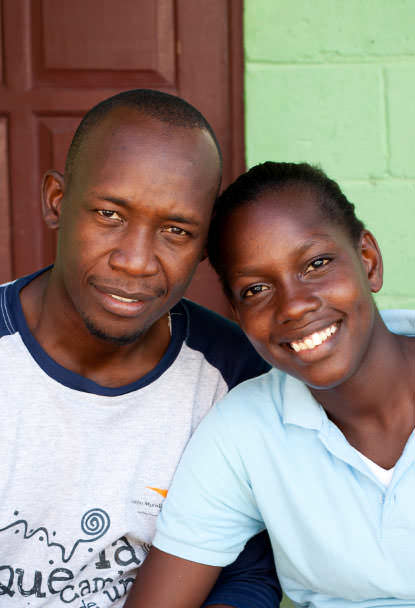

A friend to sponsored child Beri, Esteban heard about World Vision through volunteering at church. “I realized I could reach more youth through World Vision,” he says.
Everyone on the field is a girl.
“Where are your pants?” calls World Vision staff member Esteban Cuevas, 37.
“I couldn’t find them,” Jesenia Duval yells back after a solid hit sends her scrambling toward first base, her red skirt and bare feet flying.
“She wants to follow in my path,” says Esteban, nodding at Jesenia, 23, who is now safe at first.
A crowd is watching the game: mothers juggling babies, shirtless men in lawn chairs, and scads of little boys, one in extremely informal attire for a baseball game — just his underwear and a pair of pink Crocs. He executes a perfect handstand near the batter’s box.
Spewing dust, a motorbike roars by, the driver’s cap bearing the initials of the nearby sugar plantation — the backbreaking industry that drew most of the villagers’ grandparents and some great-grandparents here from Haiti generations ago.
To reach home plate, Jesenia will have to sidestep a goat that is devouring the grass near first base and a trio of cows that are slowly lumbering through the outfield.
With a cling! the metal bat meets the ball. The right fielder catches the pop fly for a third out. Jesenia and all the outfielders run in. Except for the goat, who stays at first.
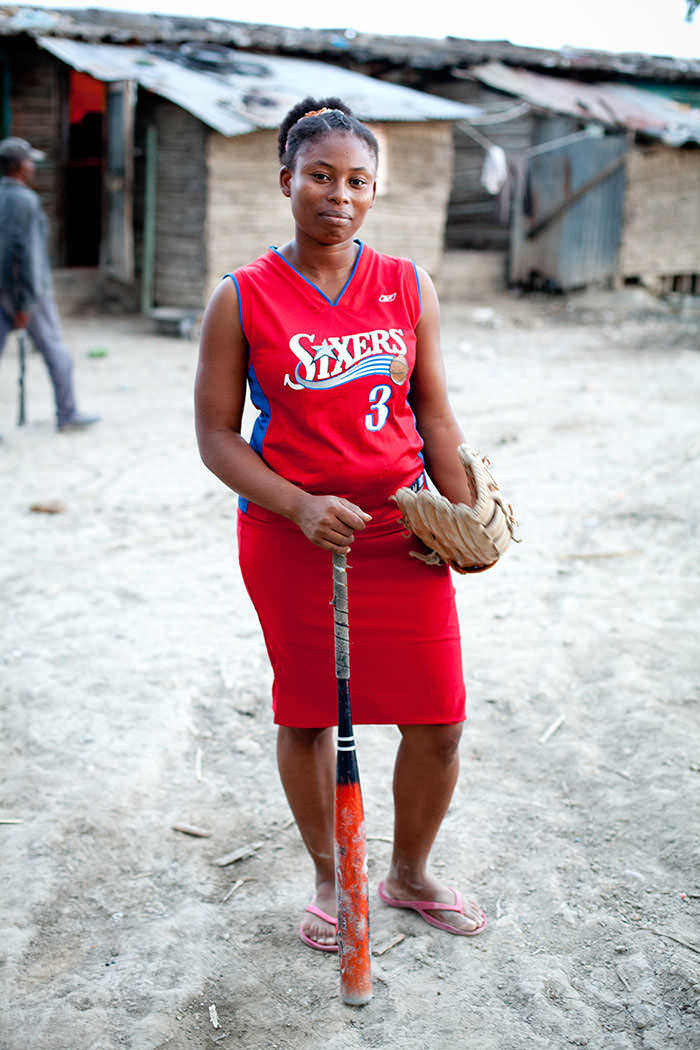

Jesenia Duval is a youth leader in the community and a role model for the younger girls on her baseball team — a mentor and a friend.
These empowered, energetic girls don’t just play together. Before each game, they pray and talk through issues that keep many Dominican girls from reaching their full potential in a nation where females regularly encounter gender-driven roadblocks, violence, and even death.
Just two weeks before, 80 miles north in Santiago, it happened again. Miguelina Martinez feared her husband so much that she’d gone to court 18 times to get a restraining order. She even made a video and posted it on YouTube. But a justice system slow to protect women let down the 31-year-old mother of four young children. Her husband entered the beauty parlor where Miguelina worked, bearing a bouquet of flowers. Hidden within the blossoms was a knife. He killed her, stabbing her more than 25 times.
“Statistics show that every 48 hours, a woman is killed by her ex-husband or her husband,” says Catalina Encarnación, World Vision’s advocacy coordinator in the Dominican Republic. One reason for the alarming statistic is that there is better domestic violence reporting in the island nation of 9.3 million people. “The other reason,” Catalina says, “is the Dominican man is not ready to take ‘no’ as an answer from women.”
It’s challenging enough to be female, but some Dominican girls, including Jesenia, endure even deeper prejudice because of their Haitian descent. Generations ago, immigrants came to work in the sugarcane fields and stayed, and their Dominican-born children are still often denied citizenship.
World Vision fights for girls like Jesenia; otherwise, her options for education would be limited. When Jesenia needed a birth certificate, it was Esteban Cuevas who took her to the nearby city, Barahona, to fight for her right to paperwork identifying her as Dominican. Today Jesenia is working toward a degree in counseling at a nearby university.
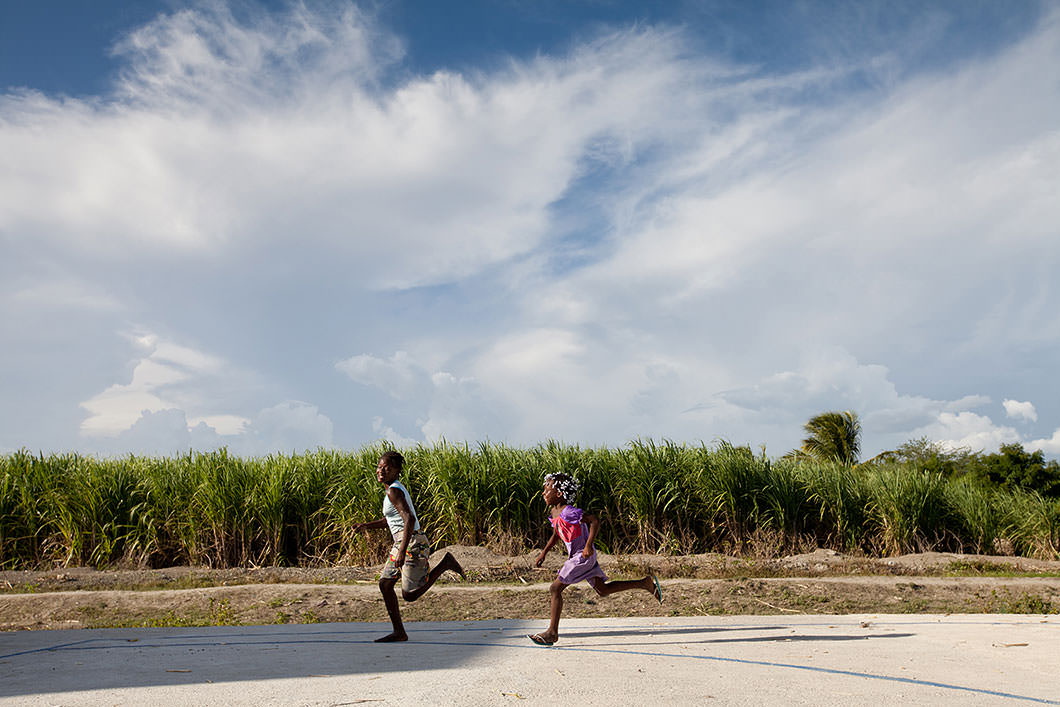

Services in the bateyes are limited, especially health, water, education, and shelter. Work in the sugarcane fields drew a steady flow of Haitians to the Dominican Republic, but today, machines have replaced many workers.
Jesenia and many other youth have grown up in bateyes, communities made up of families of Haitian ancestry who worked in the sugar industry. To the newcomer’s eye, a batey looks like pictures of Oklahoma during the Great Depression. Some families still crowd into barracónes, long houses with 12 small rooms on each side. Sixty percent don’t have water at home. Two out of three families have no bathroom.
“These communities — the government doesn’t pay any attention to them,” says project manager Emilio Desena, a 23-year World Vision veteran. “The services are very limited — especially in health, water, education, and good housing.” Eighty percent of the population is unemployed after the sugar industry replaced manpower with machinery.
Esteban is committed to these struggling communities in part because he knows of childhood hardship. As a child, Esteban was sent to work in Santo Domingo, selling produce in the market from 3 or 4 a.m. to 8 p.m. “I worked every day. There was no Sunday. There was no Saturday.” Yet he still managed to go to school, and today he is working toward a university degree in counseling. “So far it has taken 10 years,” he says.
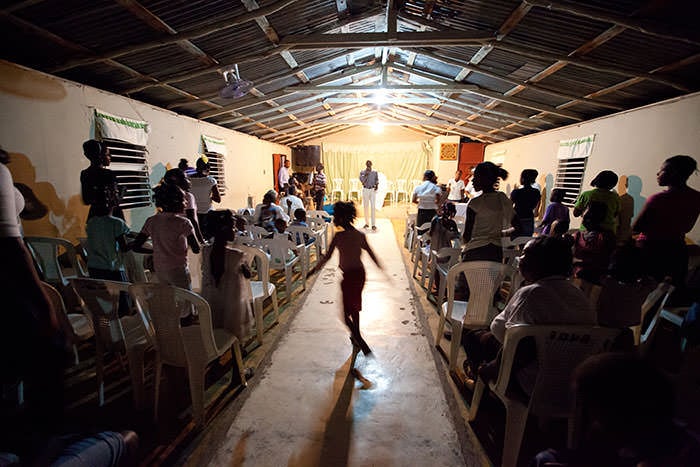
To help rebuild these struggling communities, Esteban created a dynamic outreach that attracts what he calls “a big net of youth.” He invites young people into a range of clubs that target their interests. Youth can participate in baseball, soccer, and even chess; there’s a club for caring for the environment and clubs to build kids’ faith.
Esteban meets with club leaders like Jesenia next to an old school bus parked by his house. They sit in white plastic chairs and talk through the issues facing the teens in the neighborhood. Repairing the gap between genders is Esteban’s primary focus. He works with boys and girls to build their self-esteem and respect for one another.
“I’ve learned how to stop domestic violence and how to treat women right,” says Wascar Peña. The 19-year-old, who hopes to become a doctor, says he is learning things from Esteban that his parents did not know. “I am different from the former generation.”
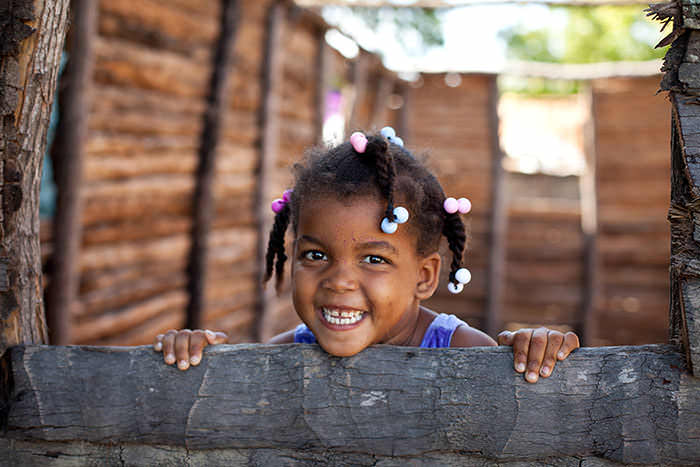
In churches and homes across the bateyes, Esteban counsels couples whose marriages are in trouble. He leads by example. “He’s a good father,” says his son Emanuel, 15. “He’s a good husband. I’ve learned many things — how to treat a woman well.” Daughter Génesis, 13, agrees. “I have never seen a father like this,” she says.
Esteban is different because of his faith. “[God] is the reason I breathe,” he says. Faith infuses World Vision’s work. “Since we promote the values of God’s kingdom in everything we do, this helps a lot. People learn easier to accept differences,” he explains. “You start seeing how Dominicans accept the Haitians in their community. When people see how we work, how we promote acceptance, they quickly adapt to this way of thinking.”
Esteban’s work comes at a cost. “Sometimes I forget to eat because I’m moving around so much,” he says. Not eating and worrying about kids have created health issues for Esteban, but there is so much to do.
“I’ve been able to see the difference,” Esteban says. “Teens that marry after being involved with World Vision prepare for marriage. They don’t live from today to tomorrow. They plan for the future.”
This kind of planning comes out of frank talk with teens about gender issues, especially the hardships that come with teen pregnancy and how to avoid this pitfall. Elena Ramirez runs the lab at the local health center, where World Vision is one of a team of partners. She says there are now fewer instances of teen pregnancy in the bateyes than a decade ago. “It’s being controlled,” she says. “I think it is because of the information that World Vision is giving to teenagers.”
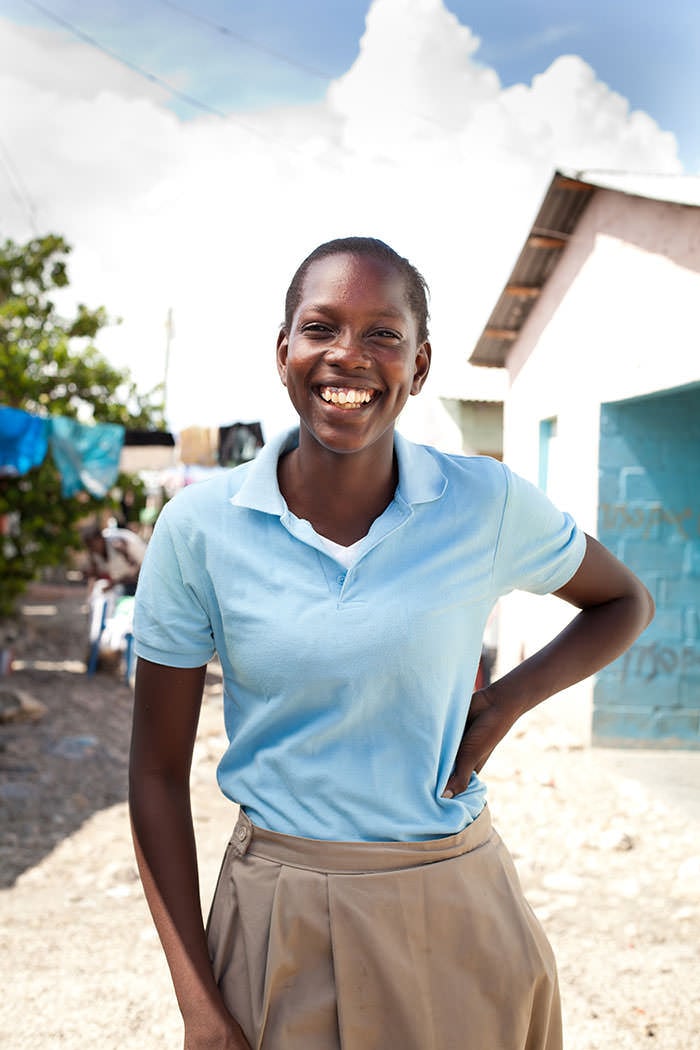

Once shy and withdrawn, Beri has learned to preach in her community and in her church.
Esteban has become a father figure to Beri Estefany Peña Enecia, 16, a sponsored child who lives with her grandmother, Nonona, 80; her mother, Laura, 34; her sister, Yocabelys, 13; and several cousins. Laura got pregnant when she was Beri’s age, and like so many women here, she is now a single mom. After a tumultuous relationship, her husband left the family nine years ago.
Beri is long and lanky with a smile that lights up an already sun-drenched day. Her sparkle is more surprising when she tells how two years ago, she couldn’t get through a day without crying.
“I only felt better when the tears would come out,” she says, especially when she watched groups of girls having fun together. “I felt so lonely that they didn’t include me.”
Laura was at wit’s end. “She was sad and crying and depressed,” she says. “I went for help to World Vision.” Esteban sought Beri out, inviting her to join youth activities.
“He included me,” Beri says. “He said, ‘How do you feel? How are things going?’ It helped break the ice. For me, he is a special person.” After that, says her mother, “she began to change.”
Esteban worked with his friend and colleague Pastor David Perez Julis to involve Beri in church activities. She teaches a children’s Sunday school class, helps lead the women’s services, and preaches on Friday nights in the bateyes to anyone who will listen. For Beri, free time is an opportunity for ministry. “She should take her bed to church,” laughs Laura.
At the heart of World Vision’s success in Beri’s batey is integrating the youth clubs with the church. World Vision provides curriculum and training to local churches. “In the past, the churches never got together for anything. World Vision helps the churches work together,” says Pastor David.
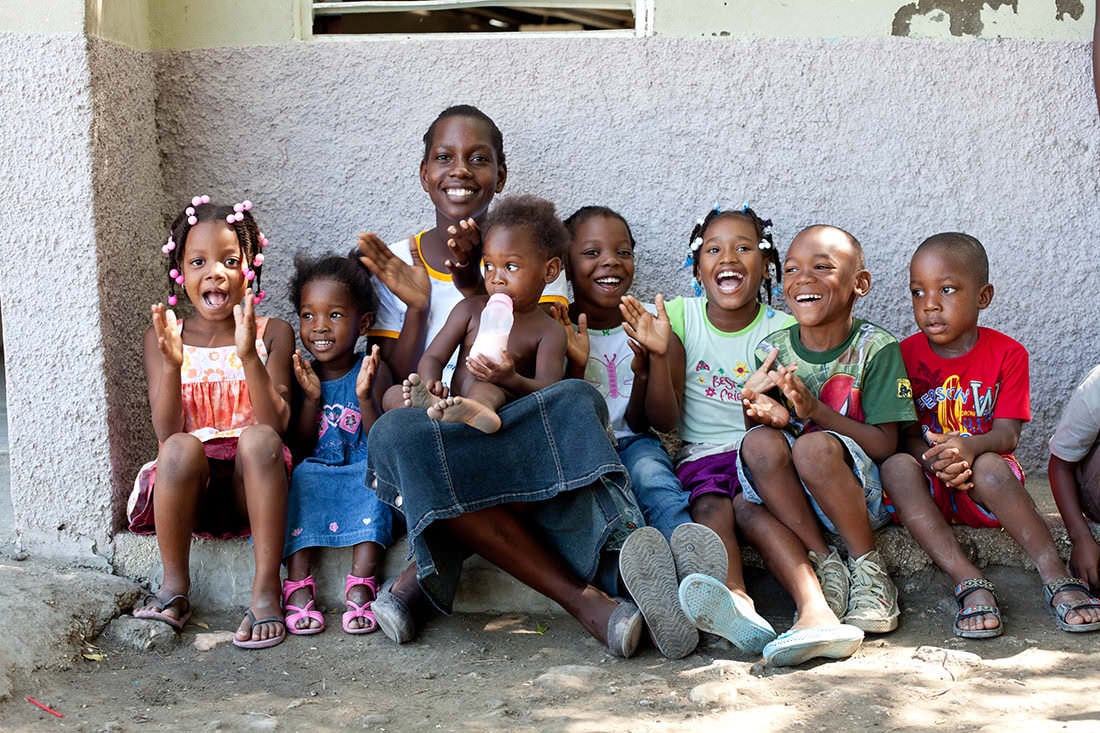

Beri spends time with her favorite people, the children of her batey. “They are the future,” she says.
Since 1997, child sponsorship has fostered transformation in the Dominican Republic, with more than 5,000 children currently benefiting from child-focused programs in this community alone. Every activity integrates spiritual nurture and engages both genders. Before World Vision began sponsorship, healthcare was nonexistent for the population of 40,000. Today, pregnant mothers and children pack into the health center for prenatal care and treatment.
Before sponsorship, washing and hygiene were arduous and sometimes dangerous for batey families. Beri’s family had no running water and no bathroom. “I always guarded [my girls] when they went to the bathroom in the sugarcane fields,” says Laura, for fear they could be attacked. Washing clothes used to be a daylong affair at a nearby river. Three years ago, World Vision worked with community members to build a tank for the batey. Now the family bathes and washes dishes and clothes at home. “That was a blessing from the Lord,” Laura says.
Beri has been blessed with opportunity. In one week alone, she traveled with Esteban to the capital, Santo Domingo, to advocate against an initiative that would add 15 years to juvenile crime sentences. She attended a workshop on emergency response, where she emerged with marching orders to help prepare her school for disasters, especially hurricanes and flooding. On Sunday, in a recreation center World Vision helped the community build, Beri taught nearly 100 children the story of Joshua and Caleb — pausing just once to break up a little-boy fistfight. She loves to work with children.
Beri may be patient, but she is driven. “I want a clear path. I don’t want any obstacles in my way,” she says. Beri plans to marry at age 24 but will wait several years to have children. Her goal is to marry an educated Christian man.
Once paralyzed by sorrow, Beri now defines faith as a verb. “It is the movement of a person,” she says. “I used to be shy and closed. I have been opening myself up to the world. Through World Vision, I have been learning so much. As I learn, my faith grows.”
It doesn’t mean Beri is out of the woods. “Sometimes she gets depressed,” says Pastor David, “but she asks for help when she needs it.” That’s when Pastor David goes to Beri’s side — with prayers, a little advice, and Bible verses to bring her comfort. There will be setbacks, but the worst, says her mother, has passed.
Beri expresses it simply: “God made me free,” she says.
This is what sponsorship is all about — freedom for youth of the bateyes — from poverty, drug abuse, teen pregnancy, and the allure of poor choices. For Esteban, it’s hard work, the kind that makes him forget to eat sometimes and other times sick with worry. But there’s always a friend like Pastor David to lean on, a whispered prayer — and somewhere in this batey, there’s bound to be a baseball game.
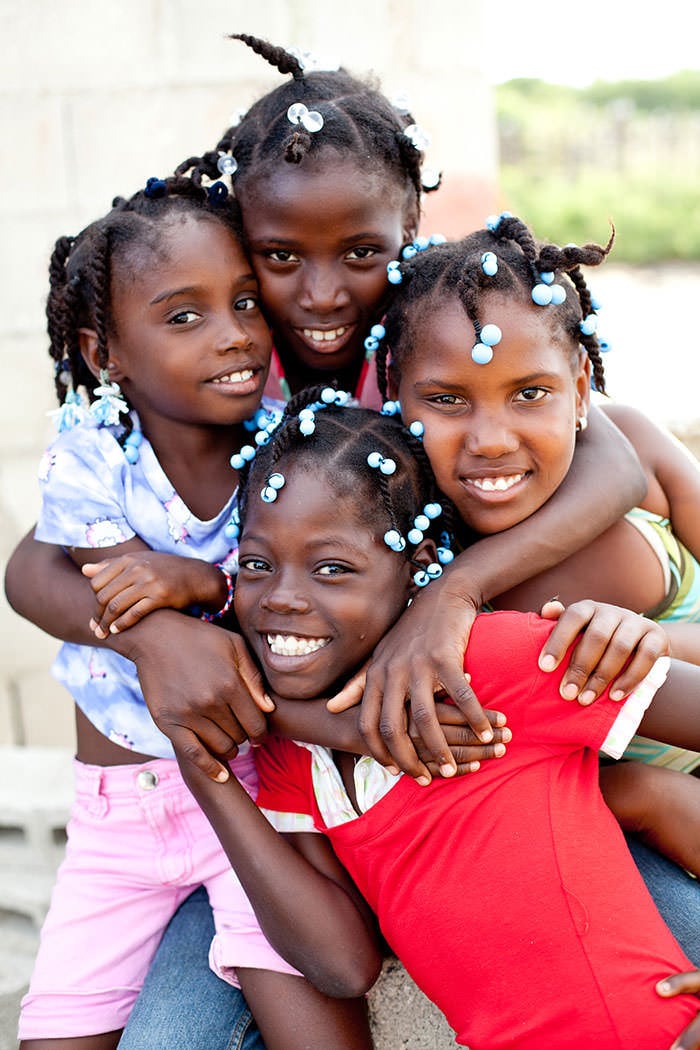

To help girls overcome challenges in the Dominican Republic, World Vision balances its work between genders, working through clubs, schools, and the church.
